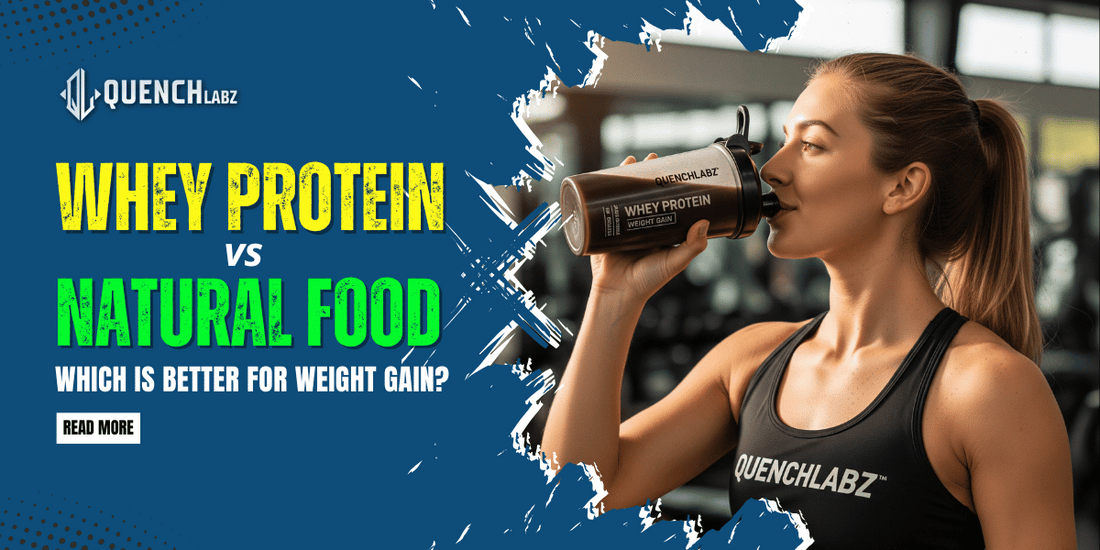Gaining healthy weight sounds simple — eat more, move less, and the weight should come. But for many people, especially hard gainers with fast metabolisms, it’s anything but easy. You eat a lot, yet the scale doesn’t budge.
That’s where the debate starts: should you stick to natural food or add whey protein to your diet to see results faster?
In this blog, we’ll break down the pros and cons of whey protein vs. natural food for weight gain, who should use what, and how to combine both for the best results.
What Exactly Is Whey Protein?
Whey protein is a complete protein extracted from milk during the cheese-making process. It’s fast-digesting, rich in essential amino acids, and one of the most bioavailable sources of protein out there.
Whey is often used by athletes and fitness enthusiasts to increase protein intake, boost recovery, and build muscle. But it’s also become a go-to option for people who are trying to gain healthy weight.
What Counts as Natural Food?
When we talk about natural food, we mean whole, unprocessed or minimally processed food items like:
-
Eggs, meat, chicken, and fish
-
Milk and dairy products
-
Rice, wheat, oats, and other grains
-
Lentils, beans, nuts, and seeds
-
Fruits and vegetables
These foods provide not just protein but also carbs, fats, fiber, vitamins, and minerals — all essential for healthy weight gain.
Why Are People Turning to Whey Protein for Weight Gain?
Let’s face it. Eating 5 to 6 full meals every day can be exhausting. You have to prep, cook, and eat even when you're not hungry. That’s where whey protein helps — it gives you a concentrated dose of protein in one small shake without making you feel stuffed.
A single scoop of whey protein gives around 20 to 25 grams of protein with just 100 to 130 calories. You can add it to milk, oats, smoothies, peanut butter, or bananas to create a powerful high-calorie shake.
Natural Food: Pros and Cons
Pros:
-
More balanced nutrition: Whole foods give you not just protein but also carbs, fiber, and healthy fats.
-
Better satiety: Keeps you fuller for longer because of volume and fiber.
-
Micronutrients: Packed with essential vitamins and minerals that support overall health.
Cons:
-
Time-consuming: Cooking, chewing, and digesting multiple large meals is not always convenient.
-
Slow digestion: Whole food takes longer to digest and absorb, which can reduce meal frequency.
-
Appetite challenge: If you’re someone with a small appetite, eating enough whole food for a surplus can feel like a task.
Whey Protein: Pros and Cons
Pros:
-
Fast absorption: Quick delivery of amino acids, ideal post-workout or between meals.
-
Easy to consume: Just shake and drink — no chewing, no mess.
-
Customizable: You can mix whey with high-calorie ingredients like banana, milk, oats, and peanut butter for a potent mass gainer shake.
Cons:
-
Lacks whole food benefits: No fiber, minimal micronutrients, and doesn’t replace real meals.
-
Not a magic bullet: You won’t gain weight unless your overall calorie intake is higher than what you burn.
-
Overuse can lead to imbalance: Relying too much on protein shakes may lead to poor diet diversity.
So, Which One Is Better for Weight Gain?
The real answer? Both.
Whey protein isn’t a replacement for real food, but it’s an excellent supportive tool to hit your daily calorie and protein goals. On the other hand, natural food should always be your base.
Choose Natural Food if:
-
You have a decent appetite
-
You prefer getting your nutrients from traditional meals
-
You enjoy cooking and eating full meals
-
Your digestion handles heavy meals well
Add Whey Protein if:
-
You struggle to eat enough calories
-
You’re not able to meet your protein goal through food alone
-
You’re always on the go and need quick nutrition
-
You workout regularly and need fast recovery fuel
Sample Day Plan to Combine Both
Here’s how you can stack whey protein with natural food to boost weight gain:
Breakfast:
Paratha with paneer + banana + milk
Mid-Morning:
Whey protein shake with oats, milk, and peanut butter
Lunch:
Rice + dal + chicken curry + salad
Evening Snack:
Nuts + fruit smoothie
Post-Workout:
Whey protein in water or milk
Dinner:
Chapati + sabzi + egg or paneer + curd
Before Bed:
Glass of milk with honey or peanut butter toast
This kind of plan helps you hit a calorie surplus while getting nutrients from both sources.
Final Thoughts
Whey protein isn’t better or worse than natural food — it’s different. And when used wisely, it can make your weight gain journey smoother and more efficient.
If you’re serious about gaining healthy weight, focus on total calories, adequate protein, and consistent eating. Use natural food as your foundation and whey protein as a convenient booster. Together, they create a powerful combo that delivers real results.






